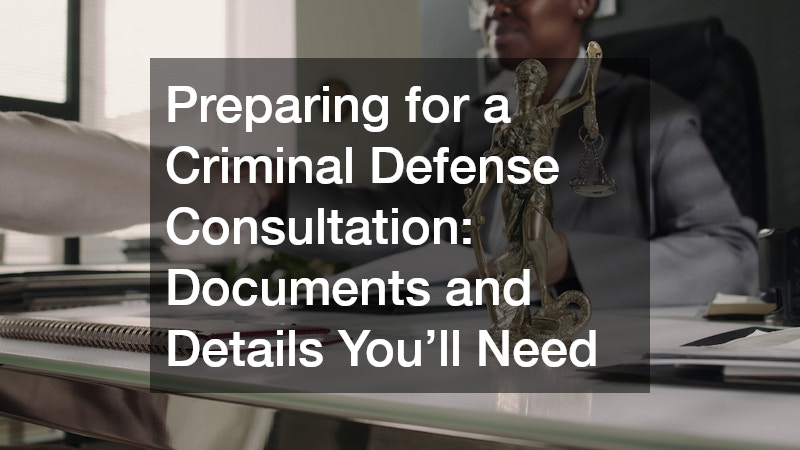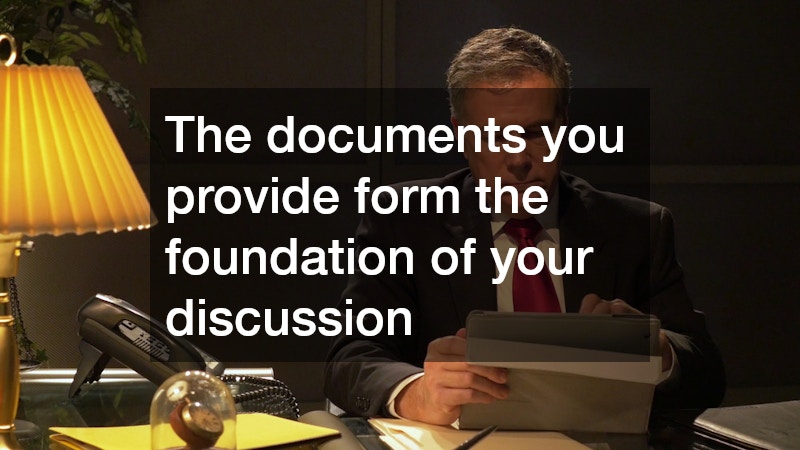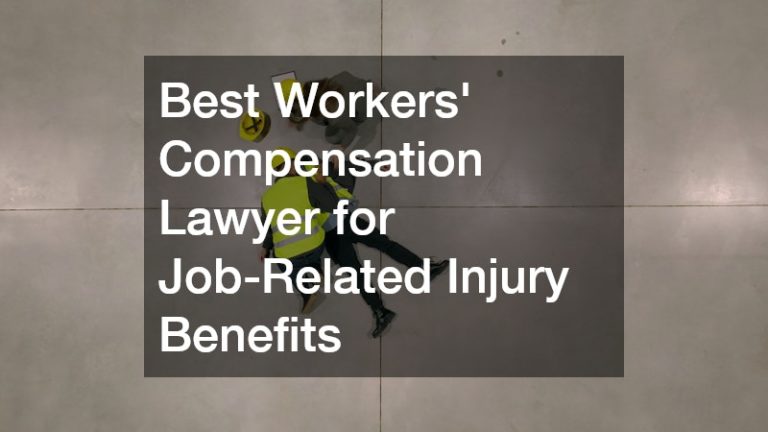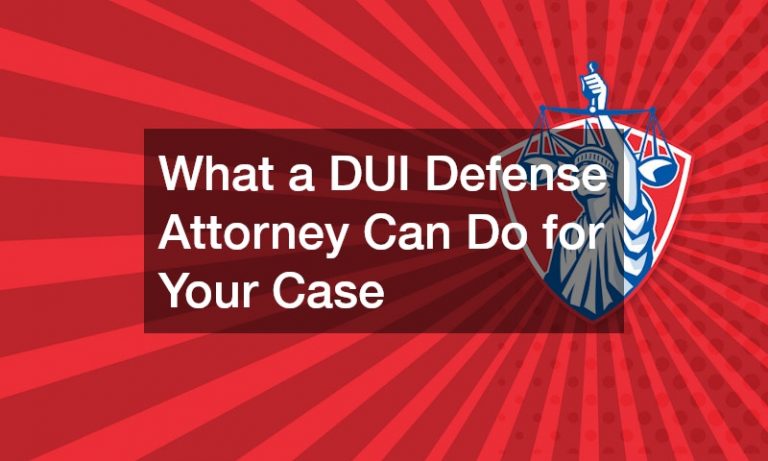
Highlights:
- Prepare well. A clear timeline and documents make free consultations more effective.
- Bring court papers. Warrants, charges, summons, and bail forms show the case status.
- Save all evidence. Photos, videos, texts, and posts can help or hurt your defense.
- List witnesses. Names and statements let attorneys follow up quickly.
- Be honest. Share everything, even if it seems harmful.
- Ask smart questions. Learn about experience, defenses, and fees.
- Stay organized. Neat folders and summaries help attorneys act faster.

When facing criminal charges, every decision matters—including your very first conversation with a lawyer. Many people begin by meeting with criminal defense attorneys offering free consultations, a service designed to help potential clients understand their options without committing to upfront fees. These initial meetings are often brief but critical. The better prepared you are, the more value you will get from the consultation.
This guide covers what you should bring, how to prepare, and why preparation matters when meeting with a defense attorney. By the end, you’ll know exactly how to maximize the time you have during a free consultation.
Why Free Consultations Are Important in Criminal Defense
Criminal defense attorneys offering free consultations provide an opportunity for individuals to evaluate their legal options. These meetings are not just about explaining charges—they’re about building trust and ensuring that the attorney is the right fit for the case.
Key benefits of a free consultation include:
- Cost-free initial advice – You can explore legal strategies without financial pressure.
- Attorney evaluation – Learn about the lawyer’s experience and approach.
- Client education – Gain clarity on potential charges, penalties, and defense options.
- Case assessment – Attorneys can identify weaknesses in the prosecution’s case early.
Because consultations are usually limited in time, preparation ensures you get the most accurate and useful advice possible.
The Importance of Preparation
Walking into a consultation without documents or details will waste valuable time. Attorneys rely on facts and paperwork to assess your situation. If you arrive prepared, you’ll:
- Show the attorney you are serious about your case.
- Allow the lawyer to provide more accurate guidance.
- Avoid delays in building a defense strategy.
- Increase the chances of spotting favorable evidence early.
Think of preparation as the first step in defending yourself—it sets the tone for the entire attorney-client relationship.
Essential Documents to Bring

When meeting with criminal defense attorneys offering free consultations, the documents you provide form the foundation of your discussion. Think of them as the raw materials your attorney will use to begin evaluating your defense strategy. Even if you are unsure whether something is relevant, it is better to bring it. Lawyers are trained to recognize useful details that you might overlook.
Here is a more detailed, step-by-step checklist:
1. Court and Legal Documents
These papers represent the official record of your case and will guide much of the attorney’s initial advice.
- Arrest warrant or citation – This document explains the legal basis for your arrest. It allows the lawyer to determine whether law enforcement followed proper procedures.
- Charging documents (complaint, indictment, or information) – These outline the exact offenses you are accused of, such as DUI, assault, theft, or drug possession. The specific charges dictate the range of possible penalties and defenses.
- Court summons or notices of hearing – These provide essential dates you must appear in court. Missing one could result in a bench warrant for your arrest. Attorneys will want to review the schedule to prepare accordingly.
- Bail or bond paperwork – If you were released, these documents detail the conditions of your release, such as travel restrictions or mandatory check-ins. Your lawyer needs to know if you are at risk of violating bond terms.
Bringing these records ensures that the attorney has a complete view of the procedural status of your case from the very first meeting.
2. Police Reports and Records
Law enforcement documentation often reveals weaknesses in the prosecution’s case.
- Incident reports – Officers’ accounts may include inconsistencies, errors, or assumptions that a defense attorney can challenge.
- Search and seizure records – If the police searched your vehicle, home, or person, the attorney will analyze whether constitutional protections were violated. Unlawful searches can sometimes lead to evidence being thrown out.
- Booking information – These records detail the circumstances of your detention and may include notes on sobriety, behavior, or possessions at the time of arrest.
Reviewing these documents allows criminal defense attorneys offering free consultations to quickly assess whether improper police procedures could work in your favor.
3. Evidence in Your Possession
Evidence you bring to the consultation can help an attorney identify inconsistencies between the prosecution’s story and the facts.
- Photographs – Images of the scene, injuries, or property damage can illustrate your version of events.
- Videos or recordings – Cell phone footage, security camera clips, or dashcam recordings can be powerful tools to dispute the prosecution’s claims.
- Physical evidence – Objects such as receipts, tickets, or personal belongings can sometimes establish alibis or timelines.
Attorneys use this material to gauge whether they can introduce reasonable doubt or support an affirmative defense.
4. Communication Records
In today’s world, digital communications often play a central role in criminal cases.
- Text messages and emails – These may show intent, clarify timelines, or provide alibi evidence.
- Social media posts – Posts or comments made by you, the alleged victim, or other parties may contradict statements given to the police.
- Voicemails and call logs – Records of phone activity can help establish who you were speaking to at critical times.
Preserving these communications is crucial. Even if you think they make you look bad, criminal defense attorneys offering free consultations must see them to understand the full picture.
5. Witness Information
Witnesses can strengthen your case, but only if your attorney can reach them promptly.
- Names and contact information – Friends, neighbors, bystanders, or coworkers who witnessed events firsthand.
- Written statements or notes – Early recollections are valuable because memory fades quickly. If witnesses already provided statements, bring them along.
Providing this information immediately gives your lawyer a head start in gathering testimony before the prosecution shapes the narrative.
6. Personal Background Records
Your history and circumstances often influence negotiations and sentencing.
- Employment history – Pay stubs, work schedules, or letters from supervisors can demonstrate that you are a responsible and productive member of society.
- Educational records – Proof of schooling, certifications, or training programs shows effort toward self-improvement.
- Medical or mental health records – Conditions such as PTSD, anxiety, or physical injuries may explain behavior and provide grounds for mitigation.
Judges and prosecutors sometimes consider these factors when deciding whether to offer diversion programs, reduced charges, or alternative sentencing.
Personal Details to Prepare
Not every important detail comes on paper. When meeting with criminal defense attorneys offering free consultations, be ready to provide accurate personal information that shapes your legal strategy.
Timeline of Events
- Exact dates and times – Specificity helps the lawyer reconstruct your movements.
- Locations involved – Addresses or landmarks can be cross-checked against witness statements or surveillance footage.
- Sequence of events – A clear step-by-step account reduces confusion and allows your lawyer to test your story against the prosecution’s.
Prior Criminal History
- Previous arrests, charges, or convictions – These may affect potential sentencing or eligibility for diversion.
- Past probation or parole – Attorneys must know if your current case could trigger violations.
- Pending cases – If you have other matters in progress, this may impact plea negotiations.
Personal Circumstances
- Work schedule and responsibilities – Your attorney may use this to argue for more flexible court dates.
- Family obligations – Dependents, caregiving duties, or household responsibilities can influence sentencing considerations.
- Financial situation – Attorneys need to know whether bail or ongoing legal fees are manageable.
The more complete your answers, the better equipped the attorney will be to propose realistic defense strategies.
Questions to Ask During the Consultation
Free consultations are not only for lawyers to evaluate your case—they are also your chance to evaluate whether the attorney is a good fit. When sitting with criminal defense attorneys offering free consultations, consider asking:
- What experience do you have with cases like mine? Attorneys who regularly handle DUI, theft, drug, or violent crime cases may be better prepared.
- What possible defenses do you see in my case? This will give you a sense of how they think strategically.
- How do you communicate with clients? Ask if they prefer email, phone, or an online portal.
- What are your fees if I decide to hire you? While the consultation may be free, representation will not be. Understanding the payment structure is essential.
- How much involvement will I need in the process? Some attorneys want clients to gather documents or track deadlines; others handle nearly everything themselves.
The answers help you judge whether the lawyer is not only skilled but also compatible with your expectations.
Organizing Your Documents and Notes
A pile of papers won’t help if the attorney cannot quickly find what they need. Before meeting with criminal defense attorneys offering free consultations, take time to organize.
- Create a folder or binder – Divide sections for court papers, police records, evidence, communications, and background documents.
- Write a personal summary – Prepare a one-page document describing your version of events and concerns. This helps keep the consultation focused.
- Highlight important dates – Circle deadlines, court appearances, or key incidents. Attorneys need to prioritize urgent matters first.
- Make at least one copy of everything – Provide a set for the lawyer while retaining originals for yourself.
This not only saves time but also demonstrates your seriousness, which can leave a positive impression.
Mistakes to Avoid in a Free Consultation
Some clients unintentionally weaken their position by mishandling consultations. When meeting with criminal defense attorneys offering free consultations, avoid:
- Withholding information – Even damaging facts must be disclosed. Surprises hurt your case later.
- Arriving with no documents – Without paperwork, the attorney cannot properly evaluate your situation.
- Overemphasizing guilt or innocence – Stick to facts. Attorneys need information, not emotional pleas.
- Failing to ask about next steps – Leave the meeting with a clear plan for what happens immediately after.
Remember, the consultation is about gathering facts, identifying options, and building trust—not about proving your case in one sitting.
How Preparation Impacts Case Outcomes
Bringing the right materials and details has a direct effect on your defense. When criminal defense attorneys offering free consultations start with a complete picture, they can:
- Identify weaknesses in the prosecution’s case before charges progress too far.
- File suppression motions if evidence was obtained unlawfully.
- Negotiate bail terms more effectively, possibly lowering financial burdens.
- Provide more accurate advice about trial versus plea options.
In short, preparation allows your attorney to start protecting your rights from day one.
Final Thoughts
Meeting with criminal defense attorneys offering free consultations is one of the most important steps you can take after being charged with a crime. But these meetings are only as valuable as the effort you put into preparation. By bringing key documents, organizing details, and asking smart questions, you give your attorney the best chance to evaluate your case and guide you toward the strongest defense.
Your future may hinge on decisions made in the first consultation. Take it seriously, prepare thoroughly, and treat that meeting as the first battle in protecting your rights.




